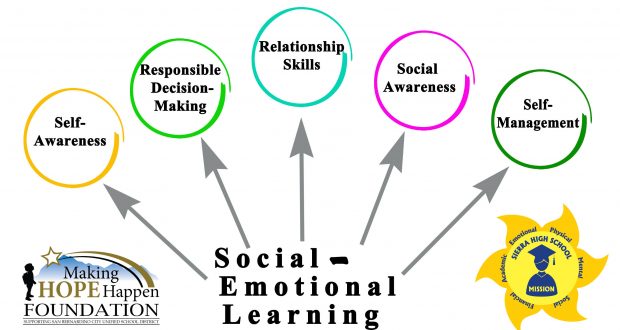SAN BERNARDINO, CA – Since students across the San Bernardino City Unified School District (SBCUSD) returned to in-person learning in August, it’s become evident that the extended COVID-related lockdowns and social distancing during the 2020–2021 school year had an impact on all aspects of youth development, including mental health.
The CDC (Centers for Disease Control and Prevention) reported that mental-health related emergency room visits among children increased in 2020 anywhere from 24 to 31 percent, depending on the specific age range. Published reports suggest that the pandemic has had a negative effect on children’s mental health.
SBCUSD is responding to these concerns with the Roadmap to Reopening and its four guiding principles. Among them is Mental & Physical Wellness, which has already manifested in a focus on social-emotional learning, offering youth mental health first aid training, and a robust school counseling program.
Social-emotional learning (SEL) helps guide students in developing self-awareness, self-management, social awareness, positive relationship, and responsible decision-making skills, which in turn help students cope with change and adversity, build and maintain positive relationships, and learn how to set and achieve goals. These core social skills can help students thrive personally, academically, and professionally throughout their lives.
“We’re teaching students how to be resilient, advocate for themselves and others, and be responsible community members,” said Colleen Williams. director of Student Wellness & Support Services. “When students know how to manage their emotions and be aware of others, we reduce instances of bullying and conflict, but we also help students who are in difficult situations learn to recognize how those situations impact them and when they need to reach out for help.”
Research shows that when schools incorporate SEL, students feel more connected to their peers and adults, do better academically, engage in fewer negative behaviors in the classroom, and have better ways to cope with anxiety and conflict.
While social-emotional learning is an important tool in helping students become more resilient so they are better able to handle life’s challenges, there will always be circumstances that can stress even the strongest person’s mental and emotional health.
The Making Hope Happen Foundation, a non-profit dedicated to supporting the District’s educational mission, is stepping in to make sure SBCUSD staff can recognize when that happens and lend a helping hand.
“Every 11 minutes someone dies by suicide, and 18 months of social distancing has been especially hard on our youth,” said Program Coordinator—Mental Health Gerzón Ceseña. “We want to make sure SBCUSD staff have the skills to recognize the signs of mental health and substance abuse issues and get our students the help they need as early as possible.”
The Foundation is offering free Youth Mental Health First Aid training to teachers, principals, and other school staff who work directly with students. Mental health first aid is similar to traditional first aid. People are taught how to evaluate if someone is in need of assistance and how to provide basic aid to keep them alive while waiting for a professional to arrive to do the real life-saving work.
“In collaboration with the Foundation, the Student Wellness & Support Services Department developed the training model for Youth Mental Health First Aid during the COVID-19 lockdowns,” said Foundation Director of Programs & Development Erin Brinker. “They were critical to making this available for teachers and staff, and when Student Wellness had to move on to other projects, the Foundation was proud to step in and offer both the financial support and staff time to keep the program running.”
In addition to making the training available for free to SBCUSD staff, the Foundation is helping schools to coordinate training sessions so that both individuals and entire groups of teachers can be trained, depending on the needs of the school community.
“We feel this is so important that we’re willing to cover the cost of a substitute teacher so our regular classroom teachers have the time to attend the training,” Brinker said. “We know it’s important that our teachers be present in the classroom for the best instruction, but we also know that it’s worth missing a few hours to get this vital training because it may mean all the difference for students suffering from mental health issues, now more than ever.”
Even before SBCUSD switched from distance learning back to in-person instruction, SBCUSD schools considered the importance of mental and emotional health to student learning and overall success in life. Sierra High School earning a RAMP designation was just one piece of evidence for that.
RAMP stands for Recognized ASCA Model Program. ASCA (American School Counselor Association) bestows the title on schools that align their counseling program and services with the ASCA National Model; deliver a data-informed, comprehensive school counseling program; and make a commitment to their school counseling program.
Only 22 schools in California and 130 across the nation received the designation at the 2021 ASCA Annual Conference, held both in person and virtually in July. Since RAMP’s inception, only about 1,100 schools have been honored. The RAMP designation is valid for five years, meaning Sierra High will retain the honor through 2026.
“These are services and supports that SBCUSD can offer students and families that other smaller school districts or charter schools may not be able to provide,” Superintendent Doc Ervin said. “Partly it’s due to the resources we have, but more so it’s because our staff, from the top down, truly care about the whole child.”
 Westside Story Newspaper – Online The News of The Empire – Sharing the Quest for Excellence
Westside Story Newspaper – Online The News of The Empire – Sharing the Quest for Excellence





